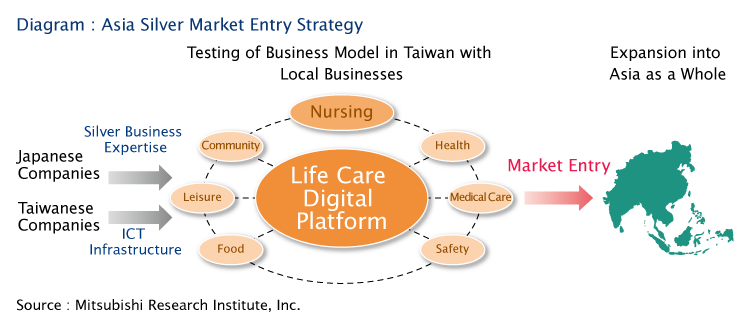Although Japan’s population is aging rapidly, some Asian countries are aging at an even greater pace. People aged 65 and over will account for more than 7% of the total population of four ASEAN countries by 2020 marking the entire region’s shift towards “ageing societies.” Combine this with China, we will see the emergence of an enormous “senior market” (those over the age of 65) comprising 170 million people.
The testing of business models in neighboring Taiwan followed by their application across Asia is an effective strategy for Japanese companies looking to expand into this enormous market (see diagram).
There are a number of reasons why. The first is that the "silver industry" (services and products provided to the senior market) is forecast to see large growth within the next few years as a result of Taiwan's particularly high rate of ageing.*1 The country is currently addressing its need for eldercare personnel through sheer volume tactics with direct employment of a large number of foreign workers across individual households. This provides Japanese companies with an opportunity for market entry via the application of systematic approaches to caregiving that effectively distribute a limited number of personnel.
The second reason is that Taiwanese mobile communications and information technology companies have been actively building digital platforms in the healthcare field. Seizing the initiative with a platform that connects the elderly with service providers would allow for a business to amass data on the senior market’s lifestyles in addition to care needs.
Finally, Taiwanese and Japanese companies have a long history of collaboration and a deep understanding of one another’s business customs. Many Japanese companies have partnered with Taiwanese peers to enter the Chinese market. Partnerships such as these may provide Japanese companies with an effective foothold for cultivating markets throughout Asia.
There will be competition, however. For example, digital health systems have already been developed in the US that integrate the management of elements such as health data, medical care, and nursing. It is only a matter of time before these services enter Asia. Japan should move quickly, capitalizing on its leading advantage with the "senior market." Growth in demand is expected in Taiwan for cutting-edge products made with the country's silver market in mind such as remote monitoring systems. Such innovations will likely be recognized as ideal products and services for the Taiwanese government’s Taiwan Health Cloud Project. Now is the time to act in order to seize the opportunities presented by this huge market in Asia.
The testing of business models in neighboring Taiwan followed by their application across Asia is an effective strategy for Japanese companies looking to expand into this enormous market (see diagram).
There are a number of reasons why. The first is that the "silver industry" (services and products provided to the senior market) is forecast to see large growth within the next few years as a result of Taiwan's particularly high rate of ageing.*1 The country is currently addressing its need for eldercare personnel through sheer volume tactics with direct employment of a large number of foreign workers across individual households. This provides Japanese companies with an opportunity for market entry via the application of systematic approaches to caregiving that effectively distribute a limited number of personnel.
The second reason is that Taiwanese mobile communications and information technology companies have been actively building digital platforms in the healthcare field. Seizing the initiative with a platform that connects the elderly with service providers would allow for a business to amass data on the senior market’s lifestyles in addition to care needs.
Finally, Taiwanese and Japanese companies have a long history of collaboration and a deep understanding of one another’s business customs. Many Japanese companies have partnered with Taiwanese peers to enter the Chinese market. Partnerships such as these may provide Japanese companies with an effective foothold for cultivating markets throughout Asia.
There will be competition, however. For example, digital health systems have already been developed in the US that integrate the management of elements such as health data, medical care, and nursing. It is only a matter of time before these services enter Asia. Japan should move quickly, capitalizing on its leading advantage with the "senior market." Growth in demand is expected in Taiwan for cutting-edge products made with the country's silver market in mind such as remote monitoring systems. Such innovations will likely be recognized as ideal products and services for the Taiwanese government’s Taiwan Health Cloud Project. Now is the time to act in order to seize the opportunities presented by this huge market in Asia.
*1:In March 2018, Taiwan’s aging rate surpassed 14% and it became an “aged society.”

